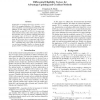Free Online Productivity Tools
i2Speak
i2Symbol
i2OCR
iTex2Img
iWeb2Print
iWeb2Shot
i2Type
iPdf2Split
iPdf2Merge
i2Bopomofo
i2Arabic
i2Style
i2Image
i2PDF
iLatex2Rtf
Sci2ools
AAAI
2011
2011
Differential Eligibility Vectors for Advantage Updating and Gradient Methods
In this paper we propose differential eligibility vectors (DEV) for temporal-difference (TD) learning, a new class of eligibility vectors designed to bring out the contribution of each action in the TD-error at each state. Specifically, we use DEV in TD-Q(λ) to more accurately learn the relative value of the actions, rather than their absolute value. We identify conditions that ensure convergence w.p.1 of TD-Q(λ) with DEV and show that this algorithm can also be used to directly approximate the advantage function associated with a given policy, without the need to compute an auxiliary function – something that, to the extent of our knowledge, was not known possible. Finally, we discuss the integration of DEV in LSTDQ and actor-critic algorithms.
| Added | 12 Dec 2011 |
| Updated | 12 Dec 2011 |
| Type | Journal |
| Year | 2011 |
| Where | AAAI |
| Authors | Francisco S. Melo |
Comments (0)

